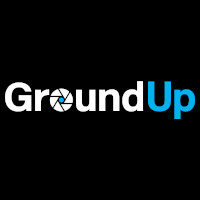Shereen Fortuin, a community leader from Concordia, leads a march through Springbok in the Northern Cape on Thursday, calling for a moratorium on all new mining applications and permit renewals. Photos: Ashraf Hendricks
People from Richtersveld, Concordia, Hondeklip Bay and other Northern Cape towns marched in Springbok on Human Rights Day
Residents of small towns in Namaqualand marched through Springbok on Human Rights Day demanding a moratorium on all new mining applications.
They want to see mine rehabilitation, proper consultation with communities on new projects, and access to services such as water and electricity.
About 100 residents from Concordia, Hondeklip Bay and small towns in the Richtersveld and Northern Cape marched through the streets of Springbok on Human Rights Day.
They want a moratorium on all new mining applications and the renewal of old mining permits. They are demanding that government departments meaningfully engage with affected communities about new developments.
GroundUp previously reported that the Richtersveld community had won a landmark case in the Constitutional Court in 2003 against state-owned diamond mining company, Alexkor.
A settlement reached in 2007 established the Pooling and Sharing Joint Venture, with Alexkor holding a 51% interest, and the community 49% through the Richtersveld Mining Company.
But the community has to date gained little from the settlement.
Marching to the Springbok sports stadium on Thursday, people chanted: “Nama land is not for sale”, “We have the right to say no”, and “We are the poor millionaires of Namaqualand”.
They were joined by the activist group VVVT Namaqualand (an Afrikaans abbreviation for free, prior and informed consent).
At the stadium, representatives from towns including Nababeep, Port Nolloth, Alexander Bay, Kommagas and others, shareed their experiences from the podium.
Ann Friedberg, a resident of Sanddrif in the Richtersveld, said that the government and mining companies “made us poor millionaires”.
When asked what she meant, Friedberg explained that while the Richtersveld was rich in mineral resources, which could make them millionaires, they “can’t put [their] hands on it”.
Shereen Fortuin, a community leader from Concordia, said that they handed over a memorandum in November to the departments of mineral resources and energy, agriculture, land Reform and rural development, and the Nama Khoi Municipality.
They are yet to get a response.
Fortuin said that the purpose of the march was to demand their constitutional rights to consultation and for their land rights to be respected.

Communities such as Richtersveld and Concordia have communal land ownership through the Transformation of Certain Rural Areas Act.
“We want to be able to take decisions over what happens over and under our land,” the group’s memo read.
Despite active mining in Namaqualand, communities face high unemployment, failing infrastructure and poor access to water and electricity, the memo said.
Marchers also demanded that land damaged by mining be rehabilitated.
The protesters want to see proper consultation over the Namakwa Special Economic Zone and the Boegoebaai Green Hydrogen mega-project.
Friedberg said that people of the Richtersveld have been given very little information on the project. “We don’t have a say about our land. But our ancestors’ bones lie there,” she said.
Recently, GroundUp reported how conflict erupted when residents protested against copper mining restarting in Concordia.
Mining is the main industry in the Northern Cape, a province rich in mineral resources. While the memorandum read that communities are not against development, they want it to be done with their consent.
“We are for development that is for the benefit of our communities and not centered on profit,” it read.
The Department of Mineral Resources and Energy did not respond to our questions at the time of publication.






